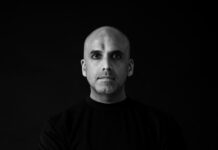Photo: Marco Gorgoroso (Jamaica Suk)
Techno can be many things, depending on how you approach. For Jamaica Suk, techno seems to be all the things. The Gradient founder has quickly made a name for herself with a sound that draws on lush dub textures and abrasive futurism alike and which might work just as well in a white cube as on the big room floor of a former power plant. As a DJ, Suk aims for a way of storytelling she calls “postmodern”. In her conbtribution to our Groove podcast, this results in a unique blend of post-rock ambient like Australia’s The Necks meeting Levon Vincent or JK Flesh and some of her own, previously unreleased material.
You’ve approached electronic music from a very special angle as a jazz musician with a passion for drone and minimal music. What drew you to dance music?
Actually all of my early influences drew me to dance music but specifically techno. In techno I found the angst from punk music, the grittiness from metal and grindcore bands, the dreaminess from shoegaze, the moodiness from drone, the avantgardism from Jazz, the trippiness from math rock bands and minimal aspects influenced from 1960s originators of minimalism such as Steve Reich, Philipp Glass and Terry Riley. Growing up I played jazz bass guitar for my high school and college and also played in shoegaze, grindcore and math rock bands on the side. The band scene in northern California had a huge influence on me and still does to this day. Meanwhile, growing up studying bass standards from my favorite Jazz composers like: Charlie Mingus, Dizzie Gillespie and Ray Charles, I grew to learn the importance of using music as political speech like how they used it back in the Chicago days. By this I mean using music to represent what you believe in, dance music especially is used to empower freedom and equality worldwide and those marginalized.
As a DJ, you’ve made your first experiences in the US’s Bay Area, a scene that has recently drawn a lot of attention to it. How did you experience it when starting out?
I moved to San Francisco in 2008 and starting going to raves in the Bay Area in 2006. The Bay Area taught me my fundamentals in dance music but was especially known for its house music scene. The rave and underground scene was flourishing at this time and I often frequented venues like the Gingerbread Warehouse and the old Compound. The old Compound underground venue booked a lot of artists from Germany and was way out at the end of San Francisco with an entry password at the front gate. This venue was really inspiring to me and the Bay Area underground music scene was thriving. The scene was very welcoming, something which is true to its hippie roots. The Bay Area Scene allowed me to curate my own events with school colleague, Dheeraj Sareen, and we organized a monthly party at 222 Hyde Street and curated a few underground events under the name Rhythm&Reason.
Apart from being a trained musician, you’ve also studied audio engineering. How do you apply all that knowledge when working in the studio?
Actually after graduating from Pyramind in 2010 it took me one year to unlearn what I learned in Audio School to find my voice as a music producer. You know the famous joke, “How many audio engineers does it take to screw in a light bulb? – Two, one to screw it in, and the other to tell them how to do it.” If there’s something you want to do in life, why not study it so you have the tools to express yourself individually. While musicianship taught me patience and discipline, Audio Engineering gave me the tools to create my own ideas and self-implement them. I also learn from visiting other studios and sharing workflows. There are things that I’m still learning today, and that is why I love working with Audio. All of these tools I apply daily into my productions, but the most important one is patience.
This year, you have inaugurated your own Gradient label with an EP called Art vs. War. Which themes informed the release?
In 2016 on the start of a US Tour I was robbed in San Francisco on Haight Street and lost my computer, all of my backups and hard drives and USBs – 4 years of music productions. This was devastating for me, especially as I’m not living in the city anymore and really value my time when I can come home to visit. This made me question how the city changed, is it so expensive now that people have to steal to earn a living? Beginning production work from scratch inspired me to start my label, to have a platform to allow myself the freedom to release music. Myles Serge once told me, “Don’t wait too long” on starting my own label, and those words were ringing around my ears especially after that loss. Diamonds and Pearls in Berlin gave me the opportunity to start with Gradient and I couldn’t be happier. It’s better to release it than to lose it, but of course not everything has to be released. To sum this up, humans can be the best and the absolute worst. Living in America is like the Wild Wild West, you can’t trust the government and you can’t always trust the information you’re learning in all of the schools. You really have to dig deep to find truth or look into alternative sources. I recommend reading A People’s History of the United States by Howard Zinn. It’s sad to say, but the only thing great that came from the Trump presidency is how it’s bringing so many people together to fight for what they believe in. This mirrors my title track, “Art vs. War” and this is my question to the world: which would you rather have?
Gradient is not only a label, but you also put on events under that name. What is the general concept of Gradient?
Gradient is a platform where I get to express myself and collaborate with other artists. The events are a great way to collaborate with venues and present the label and sound in new cities and communities where I find inspiration – Sweden has a really special techno scene and and dedicated underground culture – so I’m happy to announce the next Gradient event in Stockholm, at Kvarteret with a fresh live set from Cassegrain September 1st.
Your official bio mentions “postmodern forms of melodic storytelling”. What does this mean in regards to your DJ sets and in particular to your contribution to our Groove podcast?
Today DJs are “modern day composers.” This story in which I contribute to Groove is a postmodern melodic story of a girl who easily gets lost in the world but in the end finds her way. In my DJ sets, it depends on the time and place, the setting, the people, the vibe, in which I like to tell my story.
Last but not least: Where can we see you or behind the decks in the near future, and what are your plans as a producer and label owner?
Some exciting dates are coming up soon. Next up is the Pornceptual Boiler Room August 8th in Berlin, then the Pornceptual five year birthday, Whole Festival, Wilde Renate, Blitz Club in Munich and an Asia tour for late September. As a producer I’m working on finalizing my productions daily, and will release Gradient 002 on my own label, I have a track coming out on Monday Off’s next compilation, and am still lining up the next Gradient releases. Stay tuned!
Stream: Jamaica Suk – Groove Podcast 170
01. X103 – Thera t (Axis Records)
02. Second Woman – Apart II (Tresor)
03. Via Maris – Toys (Mistry)
04. The Necks – Blue Mountain (Ideologic Organ)
05. LNS – July Rain (LNS)
06. Equalized #002 – B Side (Equalized)
07. Arthur Robert – Schwäche (IMF)
08. Levon Vincent – 1000 Miles From Home (Novel Sound)
09. RHYW – Not Now, Not Yet (Naif)
10. Alien Rain – Alienated B1 (Alien Rain#1)
11. Eshu – Cesium (Eshu Records)
12. Tadeo – Señal en el radar (Another Intelligence)
13. Edit Select & Antonio Ruscito – Suicide Boy B2 (Edit Select)
14. Samuli Kemppi – Impossible Landscape (Semantica)
15. Singular Anomalies – Common Arrogance (Sweatshop)
16. Stef Mendesidis – Cyborg (Projekts002)
17. Jamaica Suk – Fallen (Unreleased)
18. Jamaica Suk – Twilight Rain (Unreleased)
19. JK Flesh – P104.2 (Pi Electronics)





